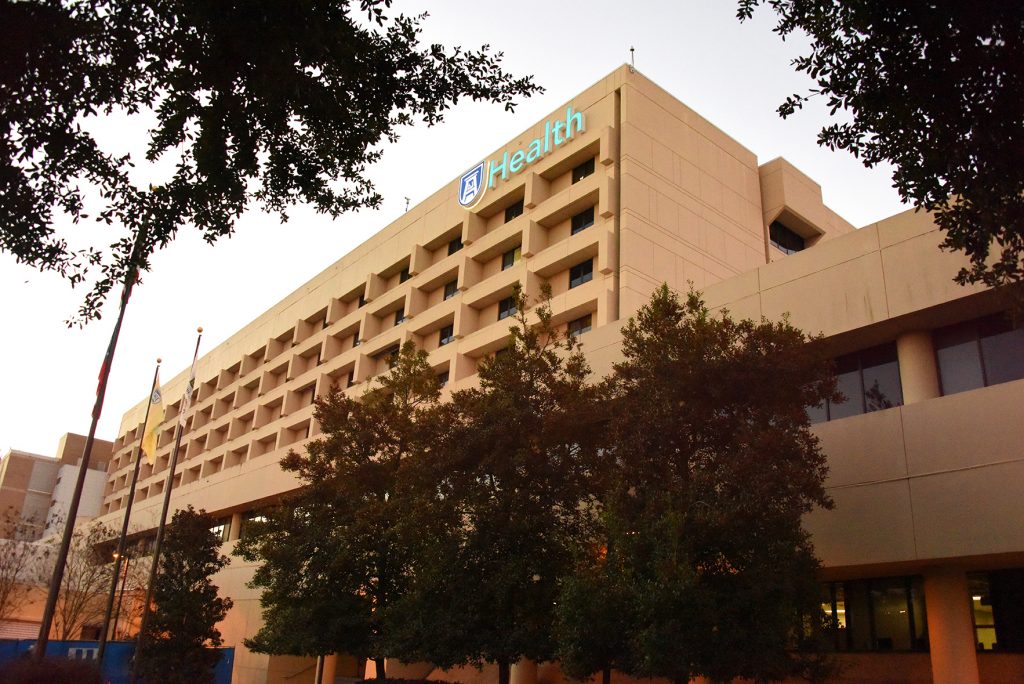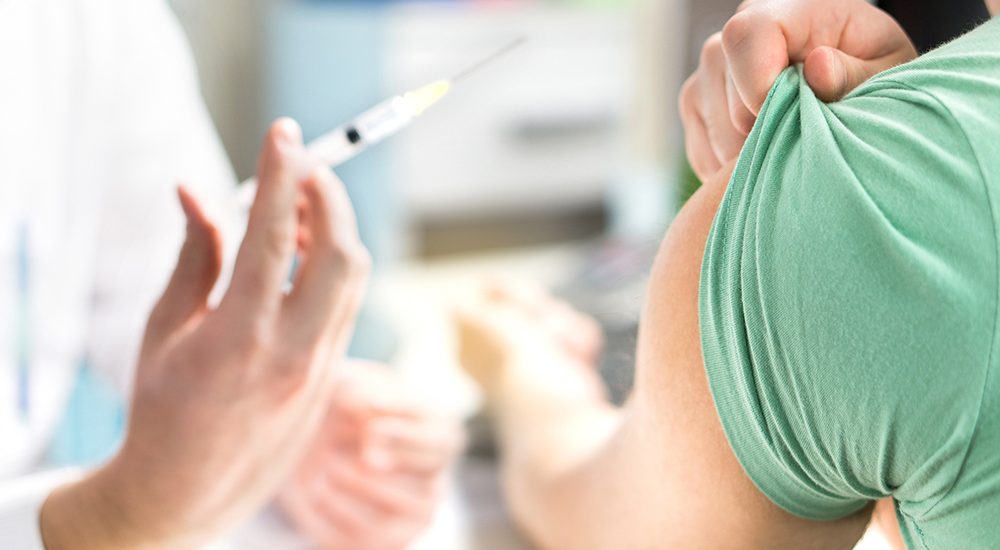As the number of COVID-19 cases continues to rise across the country, the Food and Drug Administration could possibly give emergency authorization to a vaccine developed by Pfizer and German biotech firm BioNTech by the end of the week.
Earlier this month, the Advisory Committee on Immunization Practices for the Centers for Disease Control and Prevention recommended that health care workers and long-term care facility residents — a group of approximately 24 million people — should be the first to receive the COVID-19 vaccines once they are approved.
Two different COVID-19 vaccines — one from Pfizer/BioNTech and one from Moderna — appear to be safe and effective, and both companies have applied for emergency use authorization (EUA) from the FDA. The vaccines require two doses, three to four weeks apart, to sufficiently protect individuals from the coronavirus. Therefore, proper distribution of the COVID-19 vaccine will be key.
Augusta University Health hosted a virtual town hall for health care providers at noon Wednesday, Dec. 9, to cover the latest information on the COVID-19 vaccination and plans for vaccine distribution. Watch the presentation here.
The forum featured Dr. Phillip Coule, vice president and chief medical officer for AU Health; Dr. Jose Vazquez, chief of infectious diseases at the Medical College of Georgia at Augusta University; and Joshua Wyche, director of pharmacy at AU Health. The town hall can be accessed virtually via WebEx.
As of Nov. 24, five large-scale (Phase 3) clinical trials were in progress or being planned for COVID-19 vaccines in the United States. AU Health recently announced plans to serve as a vaccine distribution hub once a vaccine is approved by the FDA.
“We’re expecting to receive the vaccine this month. If I had to predict, I think it’s going to be one to two weeks before Christmas that we will get a vaccine in-hand, ready to administer,” Coule said. “The health care providers will be the first round along with long-term care facility residents.”


If the FDA authorizes the vaccine within the next few days, it will clear the way for its almost immediate distribution to all 50 states. Operation Warp Speed, the White House-led initiative to develop and distribute vaccines, has announced its plans to begin shipping the vaccine within 24 hours of an FDA authorization.
“The next round that’s proposed is the essential workers, which are those individuals who continued to work during the stay-at-home order. That is actually a fairly large group with about 87 million essential workers that fall into that category,” Coule said. “Then, those with high-risk medical conditions would receive the vaccine, which would be about 100 million people. Also included in that group are adults over the age of 65, which would be about another 53 million people.”
One of the benefits of the COVID-19 vaccines pending approval is that the companies can produce them in large quantities, Coule said.
“Also, the companies have been producing the vaccine in anticipation that this will be approved, so the expectation is that we will get around 40 million doses between the two manufacturers in 2020,” Coule said. “Therefore, if we get somewhere between 20 million or so doses to the United States, that puts us in a position of somewhere between 300,000 and 600,000 doses to the state of Georgia in the month of December.”
Pfizer has stated it plans to produce approximately 1.3 billion doses of the vaccine worldwide by the end of 2021. Meanwhile, Moderna is estimating about 20 million doses by 2020 and 500 million to 1 billion by 2021.
“So, we are probably talking around February or March, realistically, for the average person to be able to start to get the vaccine,” Coule said. “And I stress that will be the start of getting the general public vaccinated. When will we actually be able to get all of those people vaccinated with two doses? I think we’ll be doing that all through until next summer.”
Coule also explained the COVID-19 vaccine has undergone all of the steps that are normally taken to ensure vaccine safety, but it’s only been done more efficiently and without wasting time awaiting review of the data.
“The big difference between a normal pace for development of a vaccine and the currently developed COVID vaccine was a matter of concurrent review and concurrent processes,” Coule said. “In other words, we haven’t skipped any steps in the current process, but what’s happened is that, for example, rather than compiling the data from a study at the end of the study, and then spending three months analyzing that data and then designing the next phase of the study, the review was occurring at the same time.
“So, we haven’t eliminated any of the normal safety data monitoring and vaccine safety monitoring steps that we have with any other vaccine development.”


Both Pfizer and Moderna’s vaccines are based on a genetic messenger called mRNA that instructs the body to develop spike proteins (the molecules the coronavirus uses to invade human cells). The immune system then learns to recognize the spike protein and builds up immune cells to fight the virus if the body is ever exposed, Coule explained.
Two doses are required for the COVID-19 vaccines because the first vaccine is the “prime” vaccine dose, and the second one is a “booster,” Coule said.
“The first dose primes the system and gets the body ready and trained to develop the antibodies,” Coule said. “Then, the second dose gets the body to really develop the antibodies. So, the first dose really gets the system prepared and the second dose sets the body up for the most effective response.”
In the case of the Pfizer vaccine, the two doses should be taken 21 days apart. The Moderna vaccine should be taken 28 days apart.
Both vaccines have been proven to be highly effective in protecting people from COVID-19 and preventing severe illness as a result of the virus, Coule said.
Pfizer found the vaccine was 95% effective in preventing the disease among trial volunteers who had no evidence of prior coronavirus infection and no serious safety concerns were observed, the company stated last month.
Moderna’s vaccine is reported to be 94% effective in preventing COVID-19 and 100% effective in preventing severe illness, according to the latest results announced by the company in November.
“The data on this vaccine is absolutely impressive,” Coule said. “So, between the two vaccines, and they use very similar methods, it’s been tested on around 75,000 people who participated in both studies. Half of those were given placebo and half were given the vaccine.
“In the case of the Pfizer vaccine, which had 43,000 people participate, they reported 162 people in the placebo group got COVID-19 and only eight in the vaccine group got COVID. And, in people who were over the age of 65, the vaccine was 94% effective.”
There were also only mild side effects associated with the Pfizer vaccine, he said.
“The most common side effect is fatigue and that was with only 3.8% of those who received the vaccine and only 2% of the people reported a headache,” Coule said. “But there were no serious adverse events in these 43,000 participants.”
In the case of the Moderna vaccine, Coule said there were about 30,000 participants. Half were given the vaccine and half were given the placebo.
“Moderna had 90 cases of COVID that occurred in the placebo group and only five cases of COVID-19 in the vaccine group,” Coule said. “Even more interesting is the fact that there were 11 cases of severe illness in the placebo group, but zero cases of severe COVID illness in the vaccine group.”
The vaccine by Moderna also had no serious side effects, but participants reported a slightly higher percentage of fatigue at about 9.7%.
Coule said he hopes that the public will review the results of the vaccine trials and feel confident in the safety and effectiveness of the vaccines.
“Once people see the safety of this vaccine, and compare it to even the influenza vaccination, the COVID vaccine appears to be far safer and far more effective than the influenza vaccination,” Coule said. “So, I think once people see the vaccine’s effectiveness, and once they know people who have gotten the shot and have had no side effects, this will be a no-brainer. They will want to get the vaccine. But I think it’s very important for health care providers to lead the way on this and get vaccinated.”
 Augusta University
Augusta University





